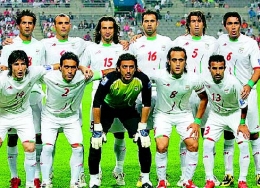Sometimes sport and politics do mix - as the controversy over Iran’s wristband-wearing footballers has shown. CATHERINE REILLY gets reaction from a Dundalk-based Iranian who also fell foul of the regime
Mojtaba Poulad-pour couldn’t believe the images on the TV set. As Iran’s national soccer team prepared to face South Korea in a World Cup qualifying match in Seoul, the camera revealed that several were wearing green wristbands.
The gesture, beamed around the world, was a show of support for Mir Hossein Mousavi, the opposition candidate in Iran’s highly disputed presidential elections which saw ultra-conservative incumbent Mahmoud Ahmadinejad re-elected.
In Iran – which is an Islamic republic – the elected president is superseded by the unelected Supreme Leader Ayatollah Khomenei, who is the country’s highest power, appointing the head of the judiciary, military leaders, media chief executives and Friday prayer leaders.
But opposition candidate Mousavi put forward a series of democratic reforms that would dent Khomenei’s control, including media liberalisation and the transfer of more powers to the president.
Mousavi says the 12 June polls – which President Ahmadinejad won by a landslide – were rigged, and large protests have followed.
But back in Dundalk, Mojtaba Pouladpour, a medical doctor and pro-democracy activist seeking asylum in Ireland, was “surprised” to see Iran’s soccer stars joining in.
“And I was much surprised in the second half when the players returned when there were no bands – except for the captain. The wearing of wristbands was symbolic, and like any democracy campaigns that happened in Ukraine, Yugoslavia, they were based around colours.”
What made the actions so courageous, suggests Pouladpour, is that the players surely knew they would not go unpunished – because in Iran, soccer and politics are inextricably tied.
“The government use football for their own purposes,” explains Pouladpour. “How? We have two main teams, Persepolis and Esteghlal – they are the two teams that are a part of the government, so the chief executives and managers are from the government. And the main body of the national team is from these two teams. They have to obey the government.”
Pouladpour says many Iranians reacted favourably to the players’ actions – and with soccer being the country’s most popular sport (rivalled by wrestling), millions of Iranians took stock when the match was aired on state TV.
“When people saw this, they said ‘Bravo, well done’, and this became top news in Iran after the match,” says Pouladpour.
But like all pro-democracy actions in Iran, dire consequences were soon to follow.
The Iranian football federation is denying that it has punished the players, but widespread reports suggest that four have been “retired”, namely 30-year-old Ali Karimi (known as the ‘Asian Maradona’), 32-year-old Vahid Hashemian (nicknamed ‘Helicopter’ for his aerial prowess), 31-year-old captain Mehdi Mahdavikia and Hosein Ka’abi, a 23-year-old wingback.
A spokesperson for soccer’s world governing body Fifa told Metro Éireann that it is seeking answers from Iran’s football authorities about the alleged punishments. Yet Fifa appears unsure how to deal with the Iranian situation.
In November 2006, for example, it suspended Iran from all participation in international soccer on grounds of governmental interference in the national football association. But this ban lasted less than a month.
Meanwhile, the wristband-wearing players didn’t break game rules – according to regulations, players must not reveal undergarments showing slogans or advertising, and their gear and boots should be free of any political, religious or personal statements. By wearing tight and unobtrusive slogan-free garments on their wrists, Iran’s players stayed within Fifa regulations, if not those of their regime.
Dundalk resident Pouladpour suggests that the players know their fate, irrespective of whether it has been signed, sealed and delivered. Their popularity soared following the actions – a humiliation for known soccer buff President Ahmadinejad, and for Iran’s Supreme Leader Ali Khamenei.
“The four players didn’t come back to Iran because people were wanting to welcome them – but the government and guards tried to stop people going to the airport,” says Pouladpour.
The Iranian doctor knows all about the punishments meted out by his country’s regime. He fled to Ireland in July 2005, claiming persecution due to pro-democracy activities. His case is under review, and in the meantime, maintaining contact with family members in Tehran has been tricky.
“It is very difficult to speak on the phone,” he says. “They say better not talking on the phone. I was talking to my brother who is a student and who was also caught by this militia group, but he wasn’t badly hurt. Another member of my family was arrested by the government and we don’t know where he is so far.”
But despite the pain and uncertainty, Pouladpour believes Iran has reached a turning point of sorts.
“When people went out on the street, they left everything at home, they left their life, their family, everything. They didn’t care about their life, because they wanted victory and freedom.
“For 20 years, I would say we’ve been living in fear of our neighbours – people have feared being reported to the government by their neighbours. Now this is gone and people don’t care about that.
“People are not going to stop this kind of protest,” he adds. “I think they’ll continue until they get a result. But on the other hand, the government wants to keep their power, their Islamic Republic.”












